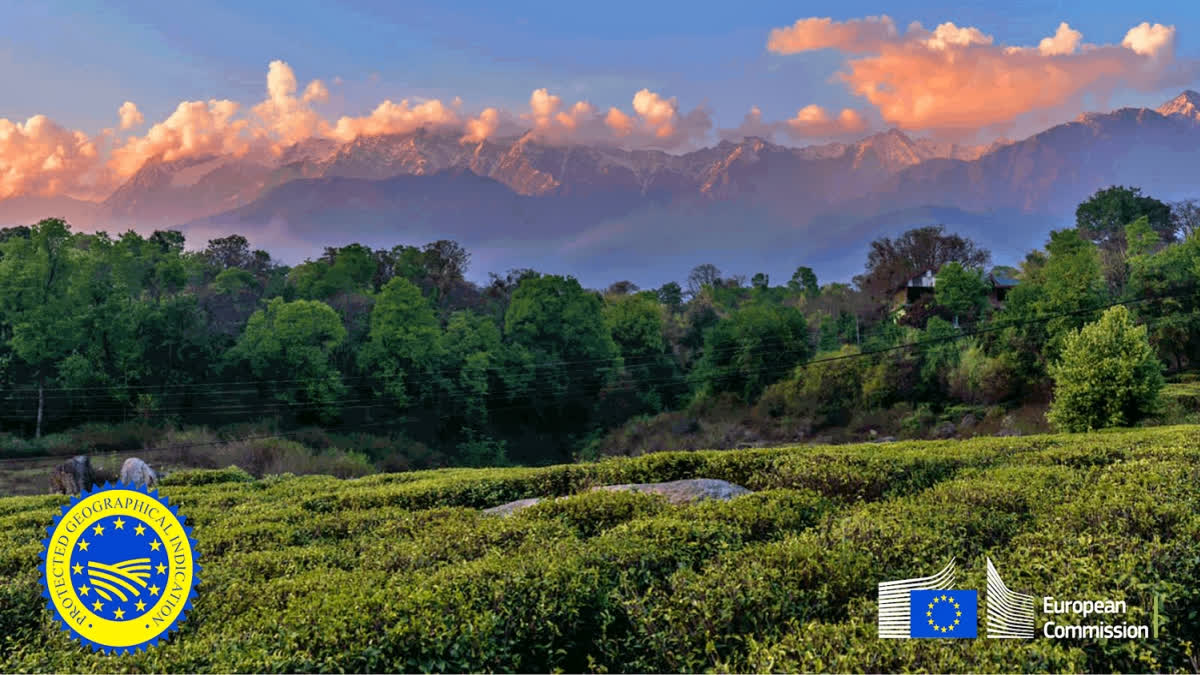New Delhi: Himachal Pradesh's Kangra Tea on Wednesday got a European Union Geographical Indication Tag (GI tag). "India#Kangra #Tea gets EU #GI tag. EU & #India both lay strong emphasis on GI, attaching high importance to local food, maintaining local traditions and preserving and promoting rich cultural heritage.#EUIndiaEkSaath," tweeted the EU official organization, EU in India.
-
🇮🇳#Kangra #Tea gets 🇪🇺 #GI tag
— EU in India (@EU_in_India) March 29, 2023 " class="align-text-top noRightClick twitterSection" data="
EU & #India both lay strong emphasis on GI, attaching high importance to local food, maintaining local traditions and preserving and promoting rich cultural heritage. #EUIndiaEkSaath https://t.co/F0UnRTGSQq
">🇮🇳#Kangra #Tea gets 🇪🇺 #GI tag
— EU in India (@EU_in_India) March 29, 2023
EU & #India both lay strong emphasis on GI, attaching high importance to local food, maintaining local traditions and preserving and promoting rich cultural heritage. #EUIndiaEkSaath https://t.co/F0UnRTGSQq🇮🇳#Kangra #Tea gets 🇪🇺 #GI tag
— EU in India (@EU_in_India) March 29, 2023
EU & #India both lay strong emphasis on GI, attaching high importance to local food, maintaining local traditions and preserving and promoting rich cultural heritage. #EUIndiaEkSaath https://t.co/F0UnRTGSQq
The tag will help Kangra tea to get an opportunity to enter the European market. Kangra tea received the Indian GI tag in 2005. Since 1999, the cultivation and development of tea have improved constantly in the Kangra region of Himachal Pradesh.
"Today we registered a new Geographical Indication from India! EU-India. #Kangra tea is grown 900-1,400 meters above sea level, on the slopes of the Dhauladhar mountain range in the Western Himalayas. It has a nutty, woody aroma and a sweet aftertaste," tweeted EU Agriculture.
The development and cultivation of Kangra tea are being promoted and looked after by four departments Tea Board of India Regional office Palampur, cooperative and agriculture departments of the state and CSIR, IHBT Palampur and Chaudhary Sarwan Kumar Agriculture University, Palampur.
'Kangra tea' is a type of tea derived from the leaves, buds and tender stems of the Camellia sinensis species as cultivated in the Kangra valley (Himachal Pradesh, India).
Also read: Assamese 'Gamocha' gets Geographical Indication tag from Centre; state in jubilation
'Kangra tea' leaves' main characteristics are: a multi-stemmed frame, and narrow leaves. 'Kangra tea' is planted from seed stock raised in the Kangra valley and other selected varieties for the region. It has distinctive nutty, winter-green, woody floral aromas in its flavour profile. The 'Kangra tea' imparts a sweet aftertaste. 'Kangra tea' has a light colour and high body in liquor.
'Kangra tea' leaves contain up to 13 per cent catechins and up to 3 per cent caffeine and amino acids such as theanine, glutamine, and tryptophan. The teas produced in the Kangra Valley are green, oolong, white and orthodox black types. The tea is produced in several areas located on the slopes of the Dhauladhar mountain ranges of the Western Himalayas. These areas are Palampur, Baijnath, Kangra, and Dharmshala in the district of Kangra; Jogindernagar in the district of Mandi, and Bhatiyat in the district of Chamba.
Kangra area, as defined in this application, enjoys the very specific geographical conditions prevailing in the snow-clad Dhauladhar mountain ranges in the Himalayas. Altitude is one very specific feature of the area as all the tea plantations are set within the altitude range of 900 to 1400 m in the mountain ranges.
'Kangra tea' is produced using high efficiency whole leaf-orthodox manufacture which means that 'Kangra tea' is made up of whole leaf and flavour-enriched leaves with the highest content of polyphenols (catechins). (ANI)



